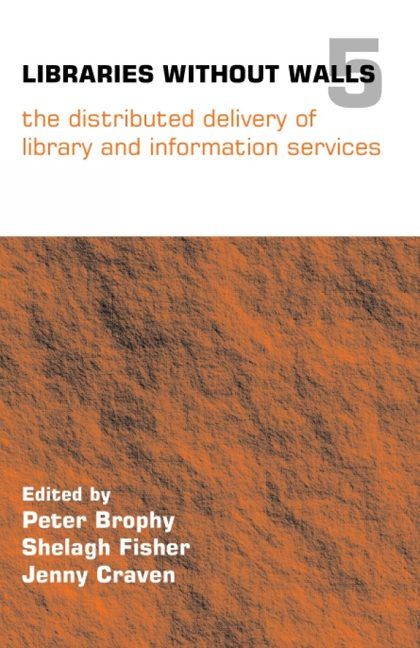Book contents
- Frontmatter
- Contents
- Contributors
- 1 Introduction
- 2 Keynote paper: beyond the mainstream of library services
- THEME 1 THE INTEGRATION OF LIBRARY SERVICES AND VIRTUAL LEARNING ENVIRONMENTS
- THEME 2 THE RELATIONSHIP BETWEEN USER NEEDS, INFORMATION SKILLS AND INFORMATION LITERACIES
- THEME 3 USABILITY AND ACCESSIBILITY OF DIGITAL LIBRARY SERVICES
- THEME 4 DESIGNING THE INFORMATION ENVIRONMENT: NATIONAL AND INSTITUTIONAL PERSPECTIVES
- THEME 5 THE CREATION OF DIGITAL RESOURCES BY USER COMMUNITIES
- 21 Cultural Objects in Networked Environments (COINE)
- 22 The DAEDALUS project: an open archiving initiative
- 23 Librarians in digital communities of practice
- 24 X4L: Exchange for Learning
- Index
- Miscellaneous Endmatter
- Miscellaneous Endmatter
- misc-endmatter
- Miscellaneous Endmatter
24 - X4L: Exchange for Learning
from THEME 5 - THE CREATION OF DIGITAL RESOURCES BY USER COMMUNITIES
Published online by Cambridge University Press: 08 June 2018
- Frontmatter
- Contents
- Contributors
- 1 Introduction
- 2 Keynote paper: beyond the mainstream of library services
- THEME 1 THE INTEGRATION OF LIBRARY SERVICES AND VIRTUAL LEARNING ENVIRONMENTS
- THEME 2 THE RELATIONSHIP BETWEEN USER NEEDS, INFORMATION SKILLS AND INFORMATION LITERACIES
- THEME 3 USABILITY AND ACCESSIBILITY OF DIGITAL LIBRARY SERVICES
- THEME 4 DESIGNING THE INFORMATION ENVIRONMENT: NATIONAL AND INSTITUTIONAL PERSPECTIVES
- THEME 5 THE CREATION OF DIGITAL RESOURCES BY USER COMMUNITIES
- 21 Cultural Objects in Networked Environments (COINE)
- 22 The DAEDALUS project: an open archiving initiative
- 23 Librarians in digital communities of practice
- 24 X4L: Exchange for Learning
- Index
- Miscellaneous Endmatter
- Miscellaneous Endmatter
- misc-endmatter
- Miscellaneous Endmatter
Summary
Introduction
This paper introduces the Joint Information Systems Committee (JISC, www.jisc.ac.uk) funded Exchange for Learning (X4L, www.jisc.ac.uk/index. cfm?name=programme_x4l) programme and highlights the approach of one particular project within the programme: Learning for a Healthier Nation.
JISC is a strategic advisory body, funded by all the UK post-16 funding councils, which provides the network infrastructure for learning, teaching and research, offers support and guidance in the use of information and communication technology (ICT), and acts as a national and international leadership body for collaboration across education and research.
The JISC Information Environment Development vision has evolved from an earlier initiative known as the Distributed National Electronic Resource (DNER) and aims to enable seamless access to a diverse range of quality resources for learning, teaching and research in a secure way. Funding has been allocated to a number of development programmes that will contribute to the realization of this vision including:
• authentication and middleware tools to bring together distributed collections of resources
• demonstrator portals, subject portals and a learning and teaching portal to allow cross-searching of these collections
• work with commercial publishers to explore the challenges and benefits to them of engaging with the information environment
• influencing the development of common standards to allow resources to be shared
• interoperability and communication with international education bodies.
X4L
X4L is part of the JISC Information Environment Development since, for the evolving information environment to be more directly useful for learning and teaching as well as research, it must be populated with suitable learning materials and case studies.
The motivation for X4L is the imperative to make the most of the considerable investment that has taken place in a range of content that has high potential value for use in learning, but needs a pedagogical framework and robust tools to ensure that it can be more easily slotted into programmes of study by the teacher or lecturer. The programme is led by 25 projects from across the UK and involves more than 100 institutions and teams from colleges, universities, libraries, JISC services, local authorities and commercial companies. X4L is a three-year programme, running from June 2002 to July 2005 with a funding allocation of around £4 million.
Information
- Type
- Chapter
- Information
- Libraries Without Walls 5The Distributed Delivery of Library and Information Services, pp. 248 - 258Publisher: FacetPrint publication year: 2004
